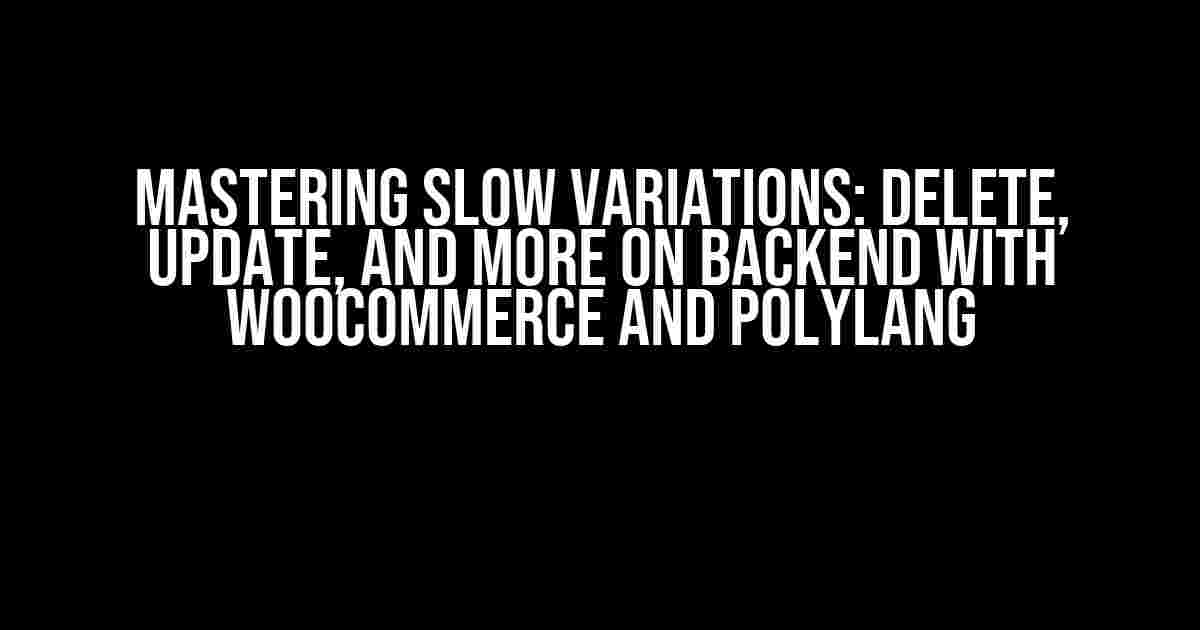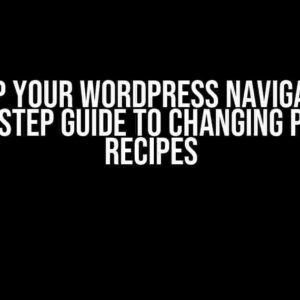Are you tired of dealing with slow product variations in your WooCommerce store? Do you want to optimize your backend operations for faster performance? Look no further! In this comprehensive guide, we’ll explore the secrets of deleting, updating, and managing product variations using WooCommerce and Polylang for WooCommerce.
Understanding Slow Variations: The Problem
If you’re using WooCommerce to manage multiple product variations, you know how frustrating it can be when your backend slows down. This issue arises when you have a large number of variations, making it difficult to manage and update them efficiently. The root cause lies in the way WooCommerce stores variation data, leading to slowed performance and frustrating delays.
The Role of Polylang for WooCommerce
Polylang for WooCommerce is a powerful plugin that allows you to create multilingual e-commerce sites with ease. While it’s primarily designed for translation purposes, it can also help optimize your variation management. By leveraging Polylang’s features, you can streamline your backend processes and delete, update, or manage product variations with lightning speed.
Delete Variations: A Step-by-Step Guide
Deleting unwanted or redundant variations is essential for maintaining a tidy and efficient WooCommerce store. Follow these steps to delete variations in bulk:
-
Install and activate the
WP Variation Masterplugin. This plugin allows you to manage and delete variations in bulk. -
Navigate to
Products > Variationsin your WooCommerce dashboard. -
Click on the
Bulk Actionsbutton and selectDelete. -
Choose the variations you want to delete and click
Apply.
Bulk Deleting Variations using Polylang
Polylang for WooCommerce offers an alternative way to delete variations in bulk. Here’s how:
function delete_variations_polylang() {
global $wpdb;
$query = "DELETE FROM {$wpdb->prefix}woocommerce_product_variations WHERE language_code = 'your_language_code'";
$wpdb->query($query);
}
add_action('admin_init', 'delete_variations_polylang');
Replace yout_language_code with the language code of the variations you want to delete. Add this code to your theme’s functions.php file and run it once to delete the variations.
Update Variations: A Guide to Efficient Editing
Updating variations can be a time-consuming task, especially when dealing with multiple products. Here’s how to update variations efficiently using WooCommerce and Polylang:
Using the WooCommerce Bulk Editor
The WooCommerce Bulk Editor allows you to update multiple variations at once. Follow these steps:
-
Install and activate the
WooCommerce Bulk Editorplugin. -
Navigate to
Products > Variationsin your WooCommerce dashboard. -
Click on the
Bulk Actionsbutton and selectEdit. -
Choose the variations you want to update and make the necessary changes.
-
Click
Updateto save the changes.
Using Polylang’s Bulk Translation
Polylang offers a bulk translation feature that allows you to update product variations in multiple languages simultaneously. Here’s how:
Navigate to Languages > Translate in your Polylang dashboard. Select the language you want to update and click Bulk Translate. Choose the variations you want to update and make the necessary changes. Click Save Translation to save the updates.
Manage Variations: Tips and Tricks
Effective variation management is crucial for maintaining a smooth and efficient WooCommerce store. Here are some tips and tricks to help you manage variations like a pro:
-
Use descriptive names for your variations to avoid confusion.
-
Organize your variations using categories and tags.
-
Regularly clean up redundant or unnecessary variations.
-
Use Polylang’s language switcher to easily switch between languages and manage variations.
-
Use the
WP Variation Masterplugin to manage and delete variations in bulk.
Common Issues and Solutions
When dealing with slow variations, you may encounter some common issues. Here are some solutions to help you troubleshoot:
| Issue | Solution |
|---|---|
| Slow variation loading | Check if you have too many variations. Delete unnecessary ones and optimize your database. |
| Variation data not updating | Check if you have cached data. Clear your cache and try updating again. |
| Polylang not translating correctly | Check if you have the latest version of Polylang. Update the plugin and try translating again. |
Conclusion
Managing slow variations in WooCommerce can be a daunting task, but with the right tools and knowledge, you can streamline your backend operations and boost performance. By leveraging Polylang for WooCommerce and following the tips and tricks outlined in this guide, you can delete, update, and manage product variations with ease. Remember to regularly clean up redundant variations, use descriptive names, and organize your variations for a smoother shopping experience.
Now, go ahead and optimize your WooCommerce store for lightning-fast performance!
Frequently Asked Question
If you’re struggling to manage slow variations delete, update, or other backend operations using WooCommerce and Polylang for WooCommerce, we’ve got you covered! Check out our top 5 FAQs to get instant solutions to your problems!
Why is deleting variations taking so long on my WooCommerce store?
Deleting variations can be a slow process, especially if you have a large number of products and variations. This is because WooCommerce needs to perform multiple database queries to delete the variation, update the product, and remove any associated metadata. To speed up the process, try deleting variations in batches, using a plugin like WP All Import, or optimizing your server performance.
How can I improve the performance of updating products with many variations in WooCommerce?
ToUpdate products with many variations efficiently, use the WooCommerce bulk update feature, or plugins like Bulk Variation Editor or Variation Swatcher. These tools allow you to update multiple variations at once, reducing the number of database queries and improving performance. Additionally, consider optimizing your server, using a caching plugin, and reducing the number of variations per product.
What’s the best way to manage translations for my WooCommerce store with Polylang?
To manage translations efficiently with Polylang, create a separate language for each translation, and use the Polylang metabox to translate products, categories, and tags. Use the Polylang sync feature to synchronize translations across languages, and consider using a translation management plugin like WPML or TranslatePress for more advanced features.
Can I use WPGraphQL to improve the performance of my WooCommerce store with many variations?
Yes, WPGraphQL can significantly improve the performance of your WooCommerce store by reducing the number of database queries and improving data fetching. Use WPGraphQL to fetch only the necessary data, and consider using a caching plugin like WP Rocket or W3 Total Cache to further optimize performance.
How can I optimize my server performance for large WooCommerce stores with many variations?
To optimize server performance for large WooCommerce stores, consider upgrading to a cloud hosting provider like WP Engine or Kinsta, enabling caching, and using a content delivery network (CDN) like Cloudflare. Additionally, optimize your database, use a query monitor plugin, and limit the number of plugins and theme functionality to reduce server load.


